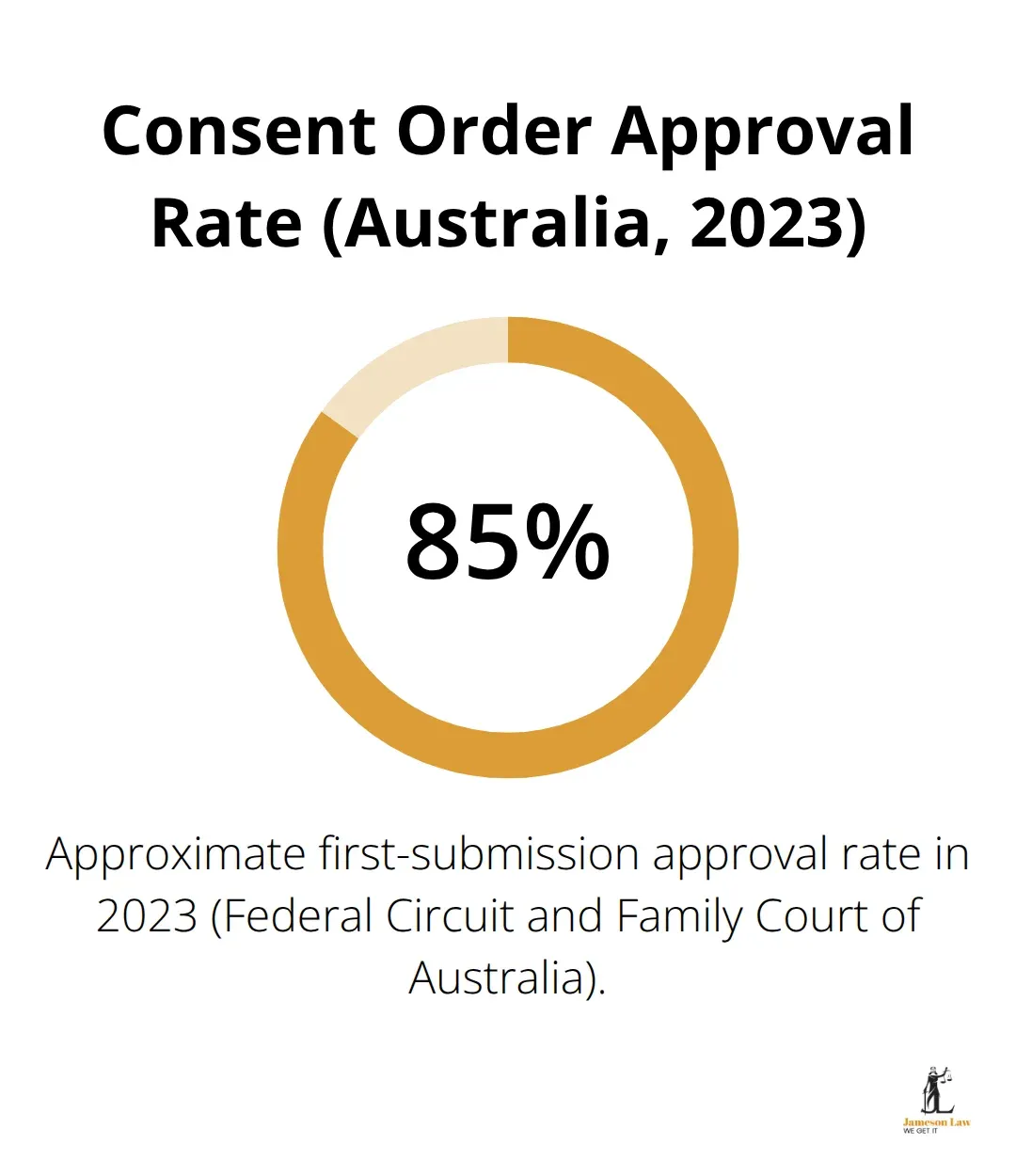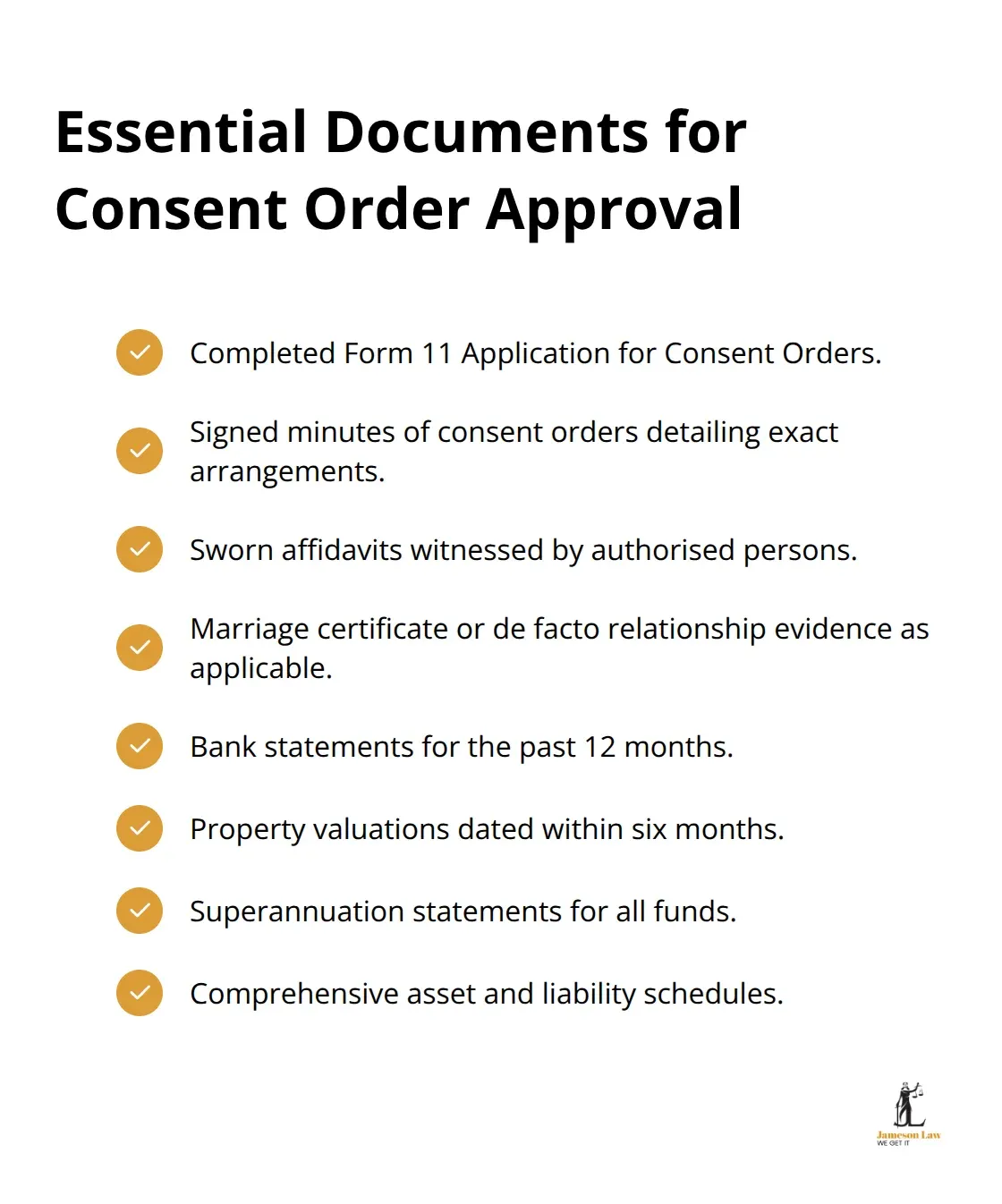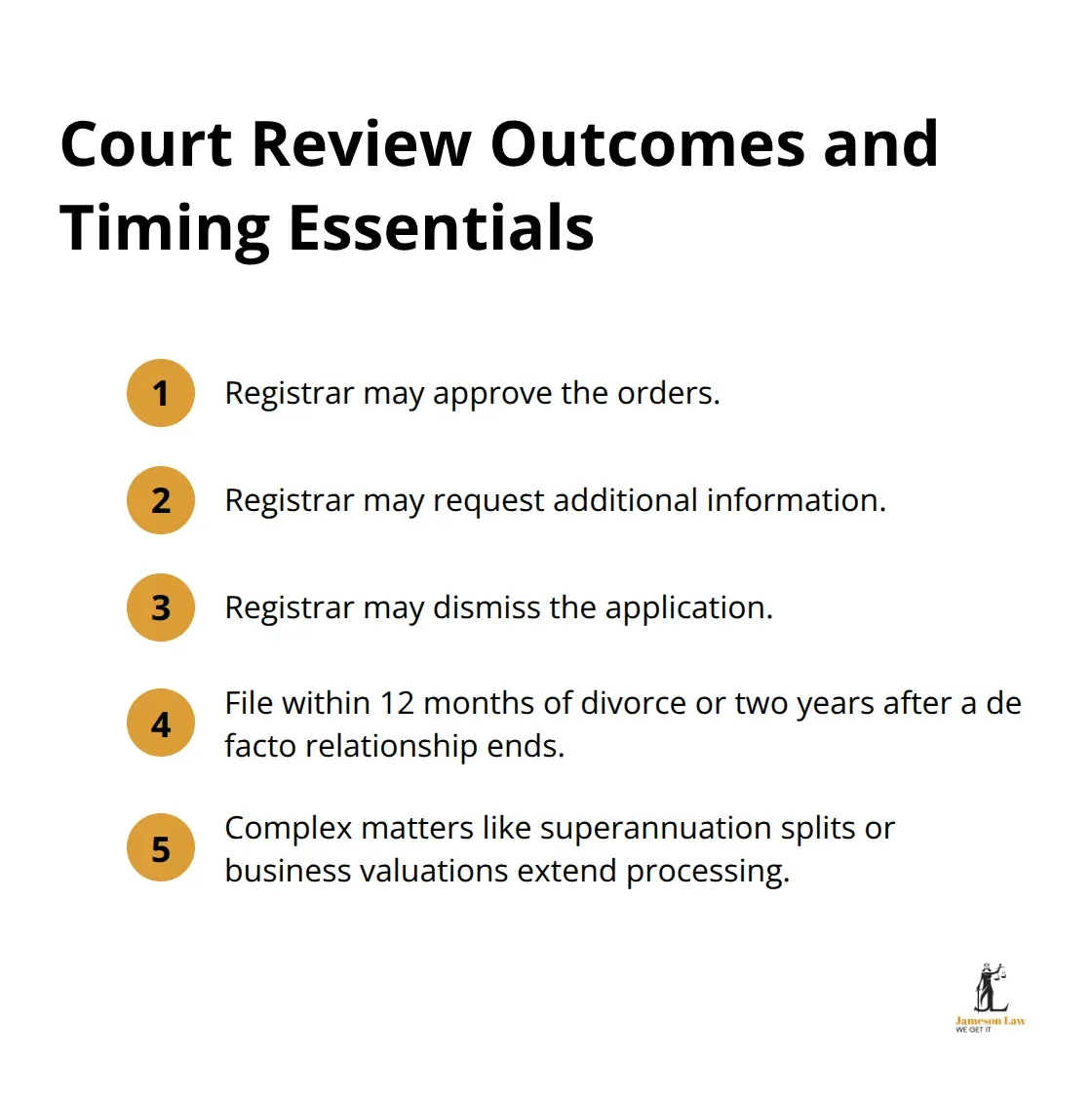Family law consent orders provide a legally binding way to formalise agreements between separating couples. These court-approved documents cover property division, child custody, and financial arrangements.
We at Jameson Law see many families struggle with the approval process due to incomplete documentation or unclear terms. Getting your consent orders right the first time saves months of delays and additional legal costs.
What Makes Consent Orders Legally Binding
Consent orders transform your separation agreement into a court-approved document that both parties must follow. The Federal Circuit and Family Court of Australia processed over 15,000 consent order applications in 2023, with approximately 85% receiving approval on first submission. These orders carry the same legal weight as court judgments, meaning non-compliance can result in enforcement action including asset seizure or imprisonment for contempt of court.

Property and Financial Arrangements
Property consent orders cover real estate, bank accounts, superannuation, investments, and debts. The court applies the four-step process established in the Family Law Act 1975: it identifies the asset pool, assesses contributions, considers future needs, and determines what is just and equitable. Financial agreements within consent orders can include spousal maintenance. Unlike binding financial agreements, consent orders cannot be challenged on grounds of unconscionability or inadequate legal advice, which provides greater certainty for both parties.
Parenting Arrangements That Stick
Parenting consent orders specify where children live, visitation schedules, decision-making responsibilities, and communication methods. Courts prioritise the best interests of the child principle and require detailed consideration of factors like the child’s relationship with each parent, protection from harm, and the benefit of maintaining meaningful relationships. Private parenting agreements lack enforceability, while consent orders allow immediate court intervention if breached (including recovery orders to return children or asset recovery to fund legal costs).
Why Courts Reject Applications
Courts reject consent orders when they fail to meet specific legal standards. The most common reason involves applications that are “not technically effective” – meaning they fail to clearly express intended legal outcomes. Applications must explain who does what, when, and how with precise detail. Incorrect witnessing of affidavits causes automatic rejection, as does incomplete documentation or failure to provide marriage certificates for married couples. Applications filed outside the one-year timeframe post-divorce or two-year timeframe post-separation for de facto relationships require court leave to proceed, which adds complexity to the approval process.
What Standards Must Your Application Meet
Courts evaluate consent order applications against strict legal benchmarks that determine approval or rejection. The Federal Circuit and Family Court requires all property settlements to satisfy the just and equitable test, which means you must demonstrate fair consideration of each party’s contributions, future needs, and circumstances. For parenting orders, courts apply the best interests of the child principle exclusively and examine various factors including the child’s safety, meaningful relationships with both parents, and protection from harm. Applications that fail these tests face automatic rejection regardless of party agreement.
Essential Documentation Requirements
Your application package must include completed Form 11 Application for Consent Orders, signed minutes of consent orders that detail exact arrangements, and sworn affidavits from both parties. Marriage certificates are mandatory for married couples, while de facto relationships require detailed affidavits that prove the relationship existed and court jurisdiction applies. Financial disclosure demands bank statements for the past 12 months, property valuations dated within six months, superannuation statements, and comprehensive asset and liability schedules.

Courts trigger immediate rejection without consideration of merits when any required document is absent.
Technical Failures That Cause Rejection
Courts reject consent order applications due to technical defects rather than substantive issues. Incorrectly witnessed affidavits represent the main cause of rejection, as affidavits must be sworn before authorised witnesses like lawyers, justices of the peace, or court registrars. Minutes of consent orders that lack specific detail about timing, responsibilities, and implementation methods fail the technically effective standard. Applications submitted outside statutory timeframes without leave to file face automatic dismissal (making timing compliance non-negotiable for successful approval).
Property Settlement Standards
The court applies a four-step analysis to determine whether property arrangements meet the just and equitable standard. First, it identifies all assets and liabilities in the matrimonial pool. Second, it assesses each party’s financial and non-financial contributions throughout the relationship. Third, it considers future needs factors such as age, health, income capacity, and care of children. Finally, it determines what division achieves fairness between the parties. Property orders that fail to address these elements adequately or propose unreasonable distributions face rejection.
The next step involves understanding how to draft terms that meet these strict standards and navigate the complex application process successfully.
How Do You Draft Consent Orders That Get Approved
Courts approve consent orders only when applications demonstrate absolute precision in language and comprehensive coverage of all arrangements. Your minutes of consent orders must specify exact dates, dollar amounts, and responsibilities without ambiguity. The Commonwealth Courts Portal processes applications continuously, but vague terms like “reasonable access” or “fair division” trigger immediate rejection. Instead, write “The father shall have the children alternate weekends from 6pm Friday to 6pm Sunday” or “The husband shall transfer his interest in 123 Main Street to the wife within 30 days of these orders.” Courts demand this level of detail because enforcement requires clear instructions that leave no room for interpretation.
Form Completion and Technical Requirements
Your application package starts with Form 11 Application for Consent Orders, which costs $365 to file unless you qualify for fee exemption due to financial hardship. Attach signed minutes of consent orders that detail who does what, when, and how for every arrangement. Include sworn affidavits from both parties that must be witnessed by lawyers, justices of the peace, or court registrars (incorrect witnessing causes automatic rejection). Upload all documents through the Commonwealth Courts Portal in PDF format, as handwritten applications face processing delays.
Property Division Specifications
Property consent orders must identify every asset and liability with precise values and transfer mechanisms. Specify bank account numbers, property addresses with full legal descriptions, and superannuation fund details including member numbers. Write “The wife shall receive 65% of the net proceeds from the sale of 123 Main Street, Suburb, NSW 2000” rather than “fair property division.” Include deadlines for all transfers and specify who pays associated costs like stamp duty, legal fees, and real estate commissions.
Parenting Arrangement Details
Parenting orders require exact schedules that eliminate interpretation disputes. Detail pickup and drop-off times, locations, and responsible parties for transportation. Address school holidays, special occasions, and communication methods between parents and children. Write “The children shall spend Christmas Day with the mother in even-numbered years and with the father in odd-numbered years from 9am to 6pm” instead of “shared Christmas arrangements.”
Court Review Process
The court registrar reviews applications and either approves the orders, requests additional information, or dismisses the application entirely. An Application for Consent Orders can be filed any time after separation but should be filed within 12 months of a divorce or two years since the end of a de facto relationship. Applications missing required documents or containing technical errors face rejection and restart the entire timeline once resubmitted. Complex property settlements involving superannuation splitting or business valuations extend processing as registrars conduct detailed reviews.

Final Thoughts
Success with family law consent orders depends on three key elements: complete documentation, precise language, and strict legal standards. Applications with technical defects face automatic rejection, while vague terms trigger court dismissal regardless of party agreement. The 85% approval rate for first submissions demonstrates that proper preparation works effectively.
Professional legal assistance becomes essential when you deal with complex property portfolios, superannuation splits, or contested parenting arrangements. We at Jameson Law help families navigate these complexities and avoid costly rejections that delay finalisation by months. Our experience with family law consent orders helps clients achieve successful outcomes on their first attempt.
Once approved, your consent orders become legally binding court judgments that both parties must follow immediately. The court will email sealed orders through the Commonwealth Courts Portal (which you should store securely as proof of your legal arrangements). Breaches can result in enforcement action including asset seizure, making compliance mandatory for both parties.













